Finance for Small and Medium-Sized Enterprises - DTI Home Page
Finance for Small and Medium-Sized Enterprises - DTI Home Page
Finance for Small and Medium-Sized Enterprises - DTI Home Page
Create successful ePaper yourself
Turn your PDF publications into a flip-book with our unique Google optimized e-Paper software.
<strong>Finance</strong> <strong>for</strong> <strong>Small</strong> <strong>and</strong> <strong>Medium</strong>-<strong>Sized</strong> <strong>Enterprises</strong>: A Report on the 2004 UK Survey of SME <strong>Finance</strong>s<br />
Comment<br />
• Also, there are significant variations in relationships by sector, ranging from<br />
28 years (Agriculture) down to 9 years (Transport).<br />
• Majority male-owned businesses have longer financial relationships than<br />
majority female owned businesses (15 years versus 12 years).<br />
• Majority white-owned businesses have longer financial relationships than<br />
majority ethnic-minority owned businesses (15 years versus 10 years).<br />
• Unsurprisingly, start-ups have much shorter relationships than established<br />
businesses (3 years versus 15 years).<br />
• High growth businesses have only half the average relationship of non-high<br />
growth businesses (16 years versus 8 years). 46<br />
Shorter<br />
relationships, among majority female-owned <strong>and</strong> ethnic-minority businesses,<br />
may<br />
be expected to have adverse consequences on their access to finance. Earlier<br />
evidence<br />
in this report suggests this is not the case <strong>for</strong> majority female-owned<br />
businesses<br />
but may apply to ethnic minority owned businesses.<br />
Shorter<br />
relationships among start-ups are unsurprising. However, their average<br />
relationship,<br />
at 3 years, indicates the relationship was established prior to start-up<br />
(recall,<br />
start-ups are aged less than two years).<br />
The<br />
much shorter relationships among high-growth businesses are interesting. On the<br />
one<br />
h<strong>and</strong>, this may reflect greater dynamism <strong>and</strong> more willingness to shop-around <strong>for</strong><br />
better<br />
terms. However, since high-growth businesses tend to be riskier, it could also<br />
be<br />
that they are more likely to switch banks be<strong>for</strong>e the lender can establish their true<br />
risk-profile.<br />
Looking ahead, we note that high growth businesses are, in fact, more<br />
likely<br />
to switch banks (see Table 6.3.4 below).<br />
6.3<br />
Price, customer satisfaction <strong>and</strong> the propensity to switch main providers<br />
So<br />
far it appears that the supply of finance to SMEs is highly concentrated in 3 or 4<br />
banks. Also, there is little willingness of SMEs to use more than one main provider of<br />
finance even where several types of financial product are used. Indeed, a long<br />
relationship, with a single main provider, characterizes the financial relationships<br />
of<br />
the vast majority of SMEs.<br />
These are, by no means, ne w findings. In f act, concerns about the lack of<br />
competition<br />
in SME banking (Cruickshank, 2000)<br />
have led to several<br />
recommendations, made by<br />
the Competition Commission, regarding behavioural remedies to promote<br />
competition, <strong>and</strong> the regulation of charges, in the provision of banking<br />
services to<br />
SMEs. These remedies prin cipally include:<br />
• Limitation<br />
on the bundling of banking services.<br />
businesses, on the other h<strong>and</strong>, decline <strong>and</strong> fail. The implication is that, by a process of selection,<br />
older<br />
businesses tend to be larger.<br />
46<br />
Controlling <strong>for</strong> other firm <strong>and</strong> owner characteristics, high growth businesses have, on average,<br />
banking relationships which are about 2 years shorter than non-high growth firms.<br />
80


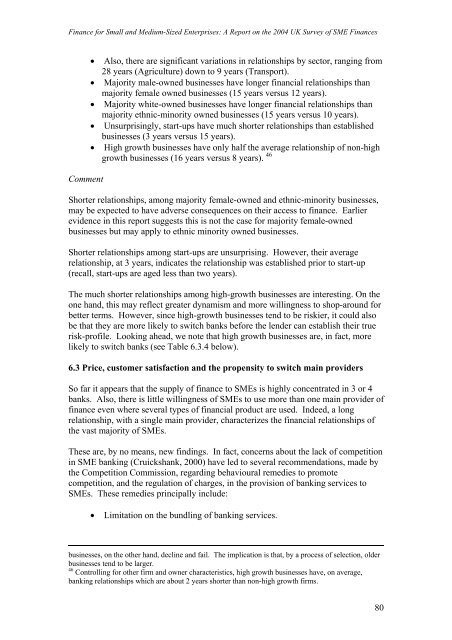
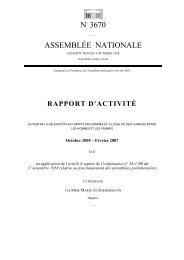


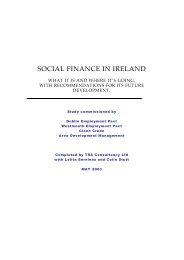



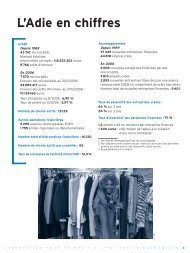
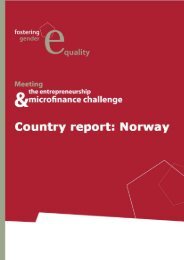


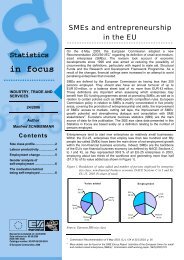
![Joint Report on Social Protection and Social Inclusion [2005]](https://img.yumpu.com/19580638/1/190x132/joint-report-on-social-protection-and-social-inclusion-2005.jpg?quality=85)
